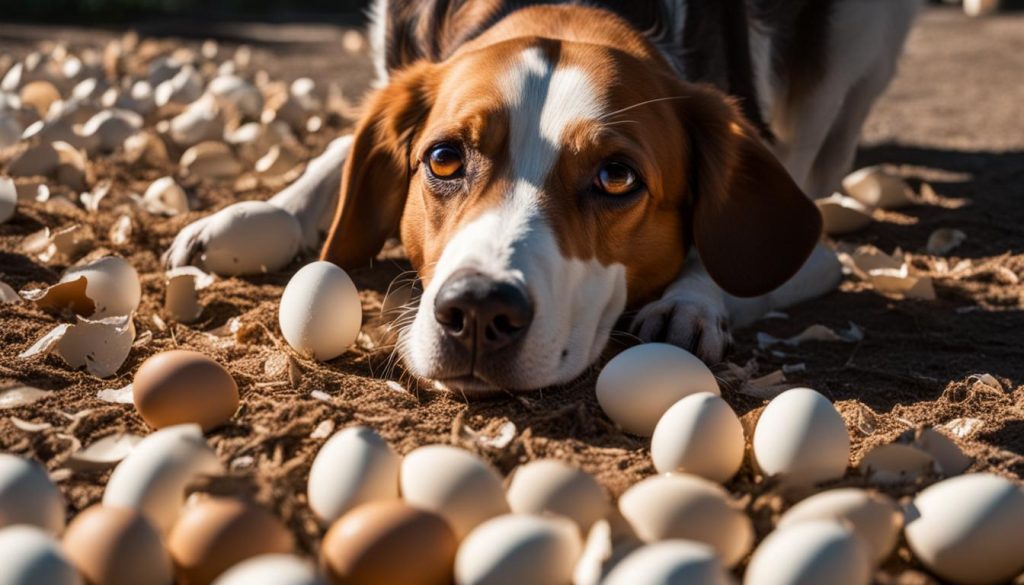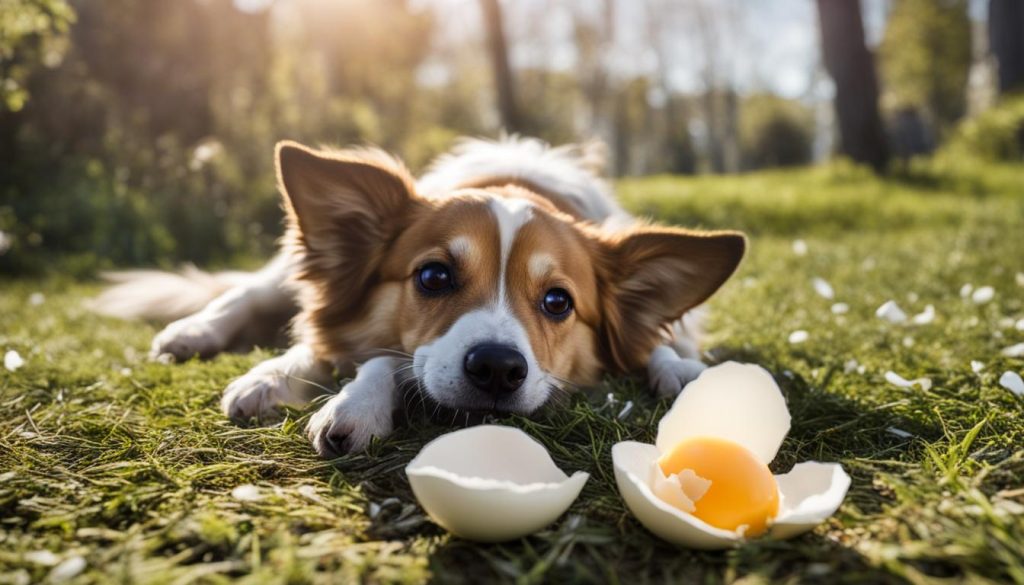Welcome to my article where I will explore the topic of whether egg shells are good for dogs. There are many myths and misconceptions surrounding this topic, and I aim to provide you with accurate and reliable information based on the latest research. So, let’s dive in and uncover the truth about the benefits of feeding egg shells to dogs and their impact on dog health.
Key Takeaways:
- Egg shells can be a natural source of calcium and other minerals for dogs.
- Incorporating egg shells into a dog’s diet may contribute to stronger bones.
- Crushed egg shells should be used in moderation and properly prepared.
- Feeding dogs raw egg shells is not recommended due to the risk of diseases.
- The color of an egg shell does not affect its nutritional value.
The Nutritional Value of Egg Shells for Dogs

Egg shells may seem like waste, but they actually contain valuable nutrients that can benefit dogs. One of the key nutrients found in egg shells is calcium, which plays a crucial role in maintaining strong bones and teeth. Calcium is essential for dogs of all ages, from puppies who are still growing to senior dogs who may be at risk for bone loss. By incorporating egg shells into a dog’s diet, pet owners can provide a natural and easily accessible source of calcium.
In addition to calcium, egg shells also contain other important minerals such as phosphorus, magnesium, and potassium. These minerals are essential for various bodily functions, including nerve function, muscle contraction, and maintaining a healthy pH balance. By including egg shells in a dog’s diet, pet owners can help ensure that their furry companions receive a balanced and nutritious meal.
Please be aware that egg shells should be crushed or ground into a fine powder before adding them to a dog’s food. This helps to break down the tough outer layer of the shell and makes it easier for dogs to digest. Pet owners can use a mortar and pestle or a blender to crush the egg shells into a powder. It’s recommended to start with a small amount of powder and gradually increase the serving size to avoid any digestive issues.
| Mineral | Amount per 10g of Egg Shells |
|---|---|
| Calcium | 800 mg |
| Phosphorus | 200 mg |
| Magnesium | 40 mg |
| Potassium | 35 mg |
It’s worth noting that while egg shells can provide valuable nutrients for dogs, they should not be the sole source of calcium in a dog’s diet. Dogs require a balanced and varied diet to meet all their nutritional needs. Consult with a veterinarian to determine the appropriate amount of egg shells to include in a dog’s diet based on their individual needs.
Incorporating Egg Shells in a Dog’s Diet for Stronger Bones

Egg shells can be a valuable addition to a dog’s diet, providing essential nutrients like calcium for stronger bones. Incorporating crushed egg shells in a dog’s nutrition can be a simple and natural way to support their bone health.
When considering including egg shells in a dog’s diet, it’s important to properly prepare the shells to ensure they are safe and digestible. Start by thoroughly washing the egg shells to remove any potential contaminants. Once cleaned, the egg shells can be crushed into a fine powder using a mortar and pestle or a blender.
To introduce egg shells into a dog’s diet, start by mixing a small amount of the crushed shells with their regular food. Gradually increase the amount over time, monitoring your dog’s reaction and digestion. It’s recommended to consult with a veterinarian to determine the appropriate quantity based on your dog’s size and individual needs.
A balanced diet is crucial for a dog’s overall health, and adding egg shells as a source of calcium can be beneficial. However, egg shells should not replace a complete and balanced diet. They should be seen as a supplementary addition to support bone health.
Table: Calcium Content in Different Food Sources
| Food Source | Calcium Content per 100g |
|---|---|
| Egg Shells | Approximately 800mg |
| Yogurt | 110mg |
| Cheese | 250mg |
| Salmon | 15mg |
| Spinach | 99mg |
As shown in the table, egg shells contain a significant amount of calcium compared to other common food sources. This makes them a valuable option for dogs who may have a calcium deficiency or require additional support for their bone health.
It’s worth noting that individual dog’s dietary needs may vary, and not all dogs will require the supplementation of egg shells in their diet. It’s always best to consult with a veterinarian who can assess your dog’s specific needs and make appropriate recommendations.
Addressing Concerns About Feeding Dogs Egg Shells
Feeding dogs egg shells can be a topic of concern for pet owners. However, it is important to understand that egg shells can actually provide several benefits to a dog’s health, particularly when it comes to promoting stronger bones.
Egg shells are a natural source of calcium, which is essential for maintaining healthy bone density in dogs. By incorporating crushed egg shells into a dog’s diet, they can receive a significant boost of this important mineral. Calcium plays a vital role in supporting the structure and strength of bones, making it an essential nutrient for dogs, especially those with certain bone-related conditions or older dogs who may be more prone to bone issues.
It is crucial to ensure that the egg shells are properly crushed to prevent any risk of choking or digestive discomfort. Additionally, it is important to use egg shells in moderation as part of a balanced diet, and not as the sole source of calcium. Consulting with a veterinarian before making any dietary changes is always recommended to ensure the specific needs of your dog are met.
| Benefits of Feeding Dogs Egg Shells |
|---|
| Provides a natural source of calcium for stronger bones |
| May support the prevention of bone-related conditions |
| Can be beneficial for older dogs with potential bone issues |
Overall, when handled and prepared properly, feeding dogs egg shells can offer a valuable nutritional boost and contribute to their overall bone health. By taking the necessary precautions and consulting with a veterinarian, pet owners can confidently incorporate egg shells into their dog’s diet to provide an additional source of calcium and promote stronger bones.
References:
- First source
Myth: Raw Egg Shells Provide More Protein for Dogs

There is a common myth that feeding dogs raw egg shells provides them with more protein than cooked egg shells. However, this is not true. Raw eggs may actually pose a risk of transmitting diseases such as Salmonellosis to dogs. It is important to prioritize their health and safety by cooking the egg shells before feeding them to your furry friend.
By cooking the egg shells, you can still ensure that your dog receives the necessary nutrients for their health. The cooked egg shells contain calcium, which is essential for strong bones and teeth in dogs. Incorporating cooked egg shells into your dog’s diet can be a natural and beneficial way to support their overall bone health.
To make sure that the egg shells are safe and easy for your dog to consume, it is important to crush them properly. This will help prevent any potential choking hazards and enable your dog to digest the egg shells more easily. Remember, moderation is key when incorporating egg shells into your dog’s diet, as excessive consumption may lead to imbalances in their nutrition.
The Myth of Organic Brown Egg Shells

There is a common misconception that the color of an egg shell determines its nutritional value. Many people believe that brown eggs are healthier than white eggs, and that organic eggs must always have brown shells. However, these beliefs are simply myths. The truth is that the color of an egg shell has no impact on its nutritional content.
The color of an egg shell is determined by the breed of the hen that laid it. Different breeds of hens produce eggs with different shell colors, ranging from white to various shades of brown. Therefore, both white and brown eggs can offer the same nutritional benefits.
Organic eggs can come in both white and brown shells, depending on the type of farm they are produced on. The term “organic” refers to the farming practices used to raise the hens, not the color of the eggs. Organic eggs are produced by hens that are raised without the use of antibiotics, hormones, or genetically modified feed.
When it comes to choosing eggs for your dog, the color of the shell is not a significant factor to consider. Instead, focus on selecting high-quality eggs from reputable sources that prioritize the well-being of the hens. This ensures that you are providing your dog with eggs that are not only nutritious but also produced in an ethical and sustainable manner.
| Nutrient | White Eggs | Brown Eggs |
|---|---|---|
| Protein | 6g | 6g |
| Fat | 5g | 5g |
| Cholesterol | 186mg | 186mg |
| Calcium | 28mg | 28mg |
| Vitamin A | 243IU | 243IU |
| Vitamin D | 82IU | 82IU |
As shown in the table above, there is no significant difference in the nutritional composition of white and brown eggs. Both types of eggs provide similar amounts of protein, fat, cholesterol, calcium, vitamin A, and vitamin D. Therefore, you can confidently feed your dog eggs regardless of their shell color.
Is Washing Egg Shells Necessary?

When it comes to incorporating egg shells in dog nutrition, the question of whether washing the shells is necessary often arises. Many pet owners wonder if washing the shells before use can help eliminate potential contaminants.
However, it is important to note that washing egg shells may actually remove a natural protective layer on the shell’s surface. This outer layer acts as a barrier against pathogens, helping to keep the egg safe from bacterial contamination. Therefore, washing the shells before consumption may increase the risk of introducing harmful bacteria.
As long as the eggs are handled and stored properly, there is no need to wash the shells before using them in your dog’s diet. The shell’s protective layer, combined with the natural antimicrobial properties of eggs, helps to ensure their safety for consumption.
| Pros | Cons | |
|---|---|---|
| Washing Egg Shells | – May remove potential contaminants – Provides peace of mind |
– Removes natural protective layer – Increases risk of bacterial contamination |
| Not Washing Egg Shells | – Maintains natural protective layer – Reduces risk of bacterial contamination |
– Potential presence of contaminants – Requires proper handling and storage |
Table: Pros and Cons of Washing Egg Shells
Ultimately, whether or not to wash egg shells before incorporating them into your dog’s nutrition is a personal choice. However, it is important to remember that proper handling and storage practices are key to ensuring the safety of the eggs. By following these guidelines, you can confidently add egg shells to your dog’s diet and reap the nutritional benefits they provide.
Myth: All Eggs Can Hatch into Chicks

There is a common misconception that all eggs, regardless of their origin or cultivation, have the potential to hatch into chicks. However, this is not true. Eggs laid by hens that have not been housed with roosters are unfertilized and cannot develop into chicks. Only eggs that have been fertilized by a rooster have the potential to develop into baby chickens. This myth may have originated from a lack of understanding about the reproductive process of chickens.
It is important to note that the eggs commonly found in grocery stores are typically unfertilized. These eggs are produced by hens that have not mated with a rooster, and therefore, they do not contain a developing embryo. When these eggs are consumed, whether by humans or dogs, there is no risk of inadvertently consuming a developing chick.
Feeding dogs egg shells, regardless of whether they are fertilized or unfertilized, can provide certain nutritional benefits. The shells of eggs, when properly crushed and added to a dog’s diet in moderation, can be a natural source of calcium and other minerals that contribute to bone health. However, it is important to consult with a veterinarian before incorporating egg shells into a dog’s diet to ensure it aligns with their specific nutritional needs.
| Myth | Reality |
|---|---|
| All eggs can hatch into chicks. | Only fertilized eggs can develop into chicks. |
| Eating unfertilized eggs can lead to consuming developing chicks. | Unfertilized eggs do not contain developing embryos. |
| Feeding dogs fertilized eggs is necessary for their health. | Egg shells, regardless of fertilization, can provide nutritional benefits for dogs. |
To summarize, the myth that all eggs can hatch into chicks is not grounded in reality. Only eggs that have been fertilized by a rooster have the potential to develop into baby chickens. Feeding dogs egg shells, whether they are fertilized or unfertilized, can contribute to their overall bone health when incorporated into their diet in moderation. It is important to prioritize consultation with a veterinarian to ensure that adding egg shells to a dog’s diet aligns with their specific nutritional needs.
Debunking the Cholesterol Myth
There has been a longstanding belief that the cholesterol found in egg yolks can significantly impact our overall cholesterol levels. However, recent research has challenged this notion and suggests that consuming eggs in moderation does not have a significant effect on most individuals’ cholesterol levels. In fact, the human body produces far more cholesterol than can be obtained from the diet alone.
Egg yolks do contain cholesterol, but they are also packed with valuable nutrients that can benefit our health, including essential vitamins and minerals. When it comes to feeding egg shells to dogs, it’s important to consider the benefits they can provide for canine health. Egg shells are a natural source of calcium and other minerals that are essential for strong bones and teeth.
By incorporating properly crushed egg shells into a dog’s diet in moderation, pet owners can help support their furry friends’ bone health. It’s crucial to emphasize that moderation is key, as too much calcium can lead to imbalances and adverse effects. It’s always best to consult with a veterinarian to ensure that a dog’s dietary needs are met and that they are receiving the appropriate amounts of nutrients.
Benefits of Feeding Egg Shells to Dogs:
- Provides natural calcium for strong bones and teeth.
- Contains additional minerals essential for canine health.
- Offers a sustainable and cost-effective nutritional supplement.
- Can be easily incorporated into a dog’s diet when properly crushed.
Feeding egg shells to dogs can be a beneficial addition to their nutrition, but it’s important to proceed with caution and ensure moderation. By understanding the nutritional value of egg shells and consulting with a veterinarian, pet owners can make informed decisions about their furry companions’ dietary needs and contribute to their overall health and well-being.
Wrapping Up
After examining the research and debunking myths, it is clear that egg shells can be beneficial for dogs. With their high calcium content and other essential minerals, egg shells can contribute to a dog’s overall bone health. Incorporating crushed egg shells into their diet can provide a natural and nutritious source of nutrients.
However, it’s important to remember that moderation is key. Too much calcium in a dog’s diet can lead to health issues, so it’s crucial to use egg shells in the right quantities. Properly crushing the egg shells before adding them to a dog’s food is essential to ensure they can be easily consumed and digested.
To summarize, egg shells are a viable option for enhancing a dog’s nutritional intake. They offer a natural way to provide the necessary minerals for stronger bones. As with any dietary changes, it’s always best to consult with a veterinarian to determine the ideal amount of egg shells to incorporate into a dog’s diet for optimal health benefits.
FAQ
Are egg shells good for dogs?
Yes, egg shells can provide a natural source of calcium and other minerals for dogs when incorporated into their diet.
What are the benefits of feeding egg shells to dogs?
Egg shells can contribute to a dog’s overall bone health by providing essential nutrients.
Is there calcium in egg shells for dogs?
Yes, egg shells are a natural source of calcium, which is important for strong bones in dogs.
How can I include crushed egg shells in my dog’s diet?
Properly crushed egg shells can be safely added to a dog’s diet in moderation.
Can dogs eat egg shells?
Yes, as long as the egg shells are crushed properly and used in moderation, they can be beneficial for a dog’s bone health.
Do raw egg shells provide more protein for dogs?
No, raw eggs may pose a risk of transmitting diseases and cooked egg shells can still provide the necessary nutrients for a dog’s health.
Do the color of egg shells determine their nutritional value?
No, the color of an egg shell does not determine its nutritional value. Both white and brown eggs can offer the same nutritional benefits.
Is it necessary to wash egg shells before feeding them to dogs?
No, washing egg shells may remove the natural protective layer of the shell. As long as the eggs are handled and stored properly, there is no need to wash the shells before using them.
Can all eggs hatch into chicks?
No, only eggs that have been fertilized by a rooster have the potential to develop into baby chickens. Eggs laid by hens that have not been housed with roosters are unfertilized and cannot hatch into chicks.
Does consuming eggs affect cholesterol levels in dogs?
Consuming eggs in moderation does not significantly affect cholesterol levels in most individuals, including dogs.






